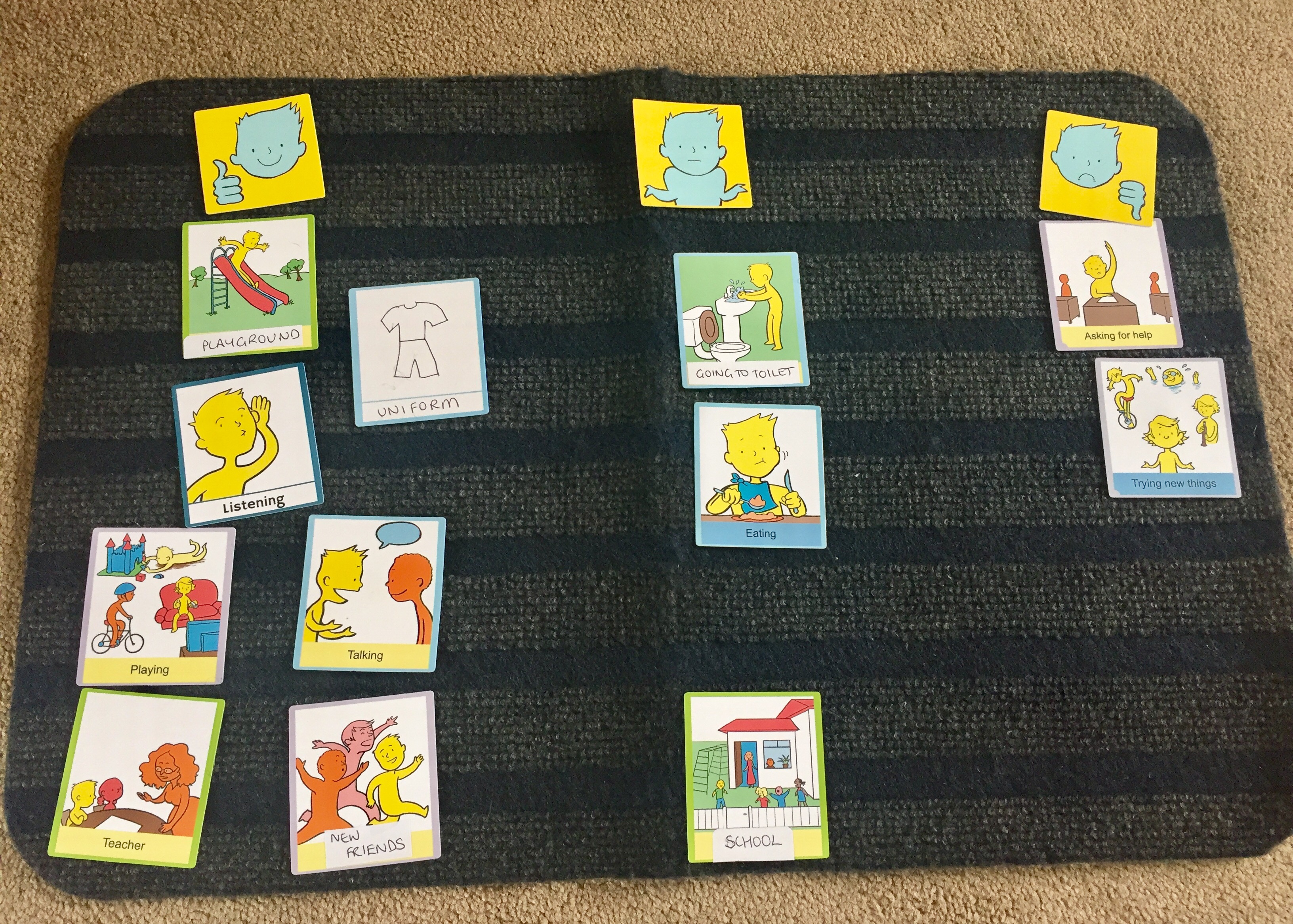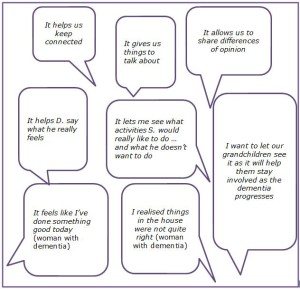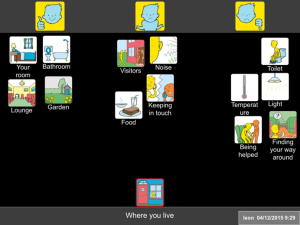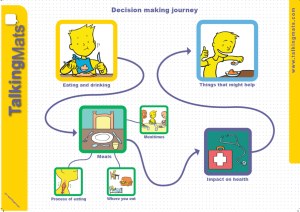Thanks to the Action Group in Edinburgh for their great blog about their co-trainer Lynnette Linton .
In 2016, a number of people with learning disabilities attended a Talking Mats training designed to build their communication skills and confidence so they could use to interview others about their community participation, in regard to Charter for Involvement goals. One of those trained was Lynnette Linton, the National Involvement Network Chairperson, and a Service User of The Action Group in Edinburgh.
Lynnette interviewed several fellow service users using Talking Mats, and was supporting in the role of ‘Listener’ by Liz Taylor, an Action Group Training Officer, who as a consequence of this work requested to become an Accredited TM Trainer. The Charter highlights that support organisations should involve Service Users in training their staff, so it then seemed natural for Liz and Lynnette to deliver TM training to Action Group staff together, with Lynnette in the role of volunteer co-trainer.
Lynnette has since been a core part of training over 50 employees (including those at Senior levels) in Foundation Talking Mats training with the Keeping Safe add-on. Liz says, it helps that Lynnette is “naturally gifted at speaking to people, and ably demonstrates the significance of TM as a means of having your say on the service you wish to receive”.
Lynnette and Liz do a demonstration Mat together, and then when trainees are doing their own Mat or showing their videos, Lynnette points out where they are applying the key TM principles (Lynnette enjoys issuing certificates to those who successfully complete the course). She also shares anonymised stories from her experience of interviewing ‘Thinkers’, which help get across what Action Group Users “want to change and improve about their service”.
Liz says, “Our first experience of demonstrating a Mat together didn’t quite go to plan, as Lynnette became unexpectedly upset when discussing her views of a football team, when she was reminded of a close friend who had died who had been a fan”. As difficult as this was for both Lynnette and Liz at the time, it was a powerful example of how TM helps us express emotions we may not even have been ourselves aware are ‘under the surface’, and sparked real interest in TM as a communicative tool.
The Action Group started gathering feedback specifically for Lynnette in her role as co-trainer, as part of the training evaluation and trainees have said that “she is exceptionally welcoming and puts everyone at ease; her passion for the topic is very evident, and it is very beneficial to hear real life examples, and how TM helps in her own life”. This includes how Lynnette benefits from the Keeping Safe pack, as a means of raising more ‘difficult’ issues.
Lynnette says, “As a service user, I also now see myself as an important, valued co-trainer. [Training] is something I see myself doing more of in the future. My confidence has shot right up. It makes me feel proud, and my parents get to hear about it at my Review”.
Staff also see the real importance of acting on the actions from each person’s Mat. Lynnette acknowledges that co-delivering has sometimes “been difficult, because I know some of the people we’re training. But I’ve been able to speak up about what I want from my support, my environment.” Recently she trained her own Service Development Manager and Team Manager, and although she felt it was harder to be honest, she had a captive audience, and her Managers then followed through on actions from her demonstration mats: “It’s made a difference to me, after doing a Mat with my DM about my home. I put ‘safety’ in the ‘Thumbs Down’, because I get frightened, and now I’ve got a security chain and a peephole on the door”.
“I never thought I would be training the staff. Now we’re booked up!”
Click for information about the Accredited training and or the Keeping Safe resource mentioned in the blog
Laura’s 4 year old twin boys are just about to start school and she was finding it difficult to have a proper chat with them about how they are feeling. She wanted to think about how best to help them prepare for the transition from nursery so used Talking Mats.
We have done lots of ‘practice mats’ over the past few months – focusing on topics such as ‘food’, ‘animals, and ‘toys/games’, so I knew that the boys were both familiar with Talking Mats before I introduced the more emotive topic of ‘School’.
P was first to have a go at being a ‘Thinker’, with me as the ‘Listener’. We used the Top Scale ‘Happy about/ Not Sure/ Not Happy About’. P thought very hard about placing each option. It helped to have the pictures and mat to focus on rather than just me firing questions at him.
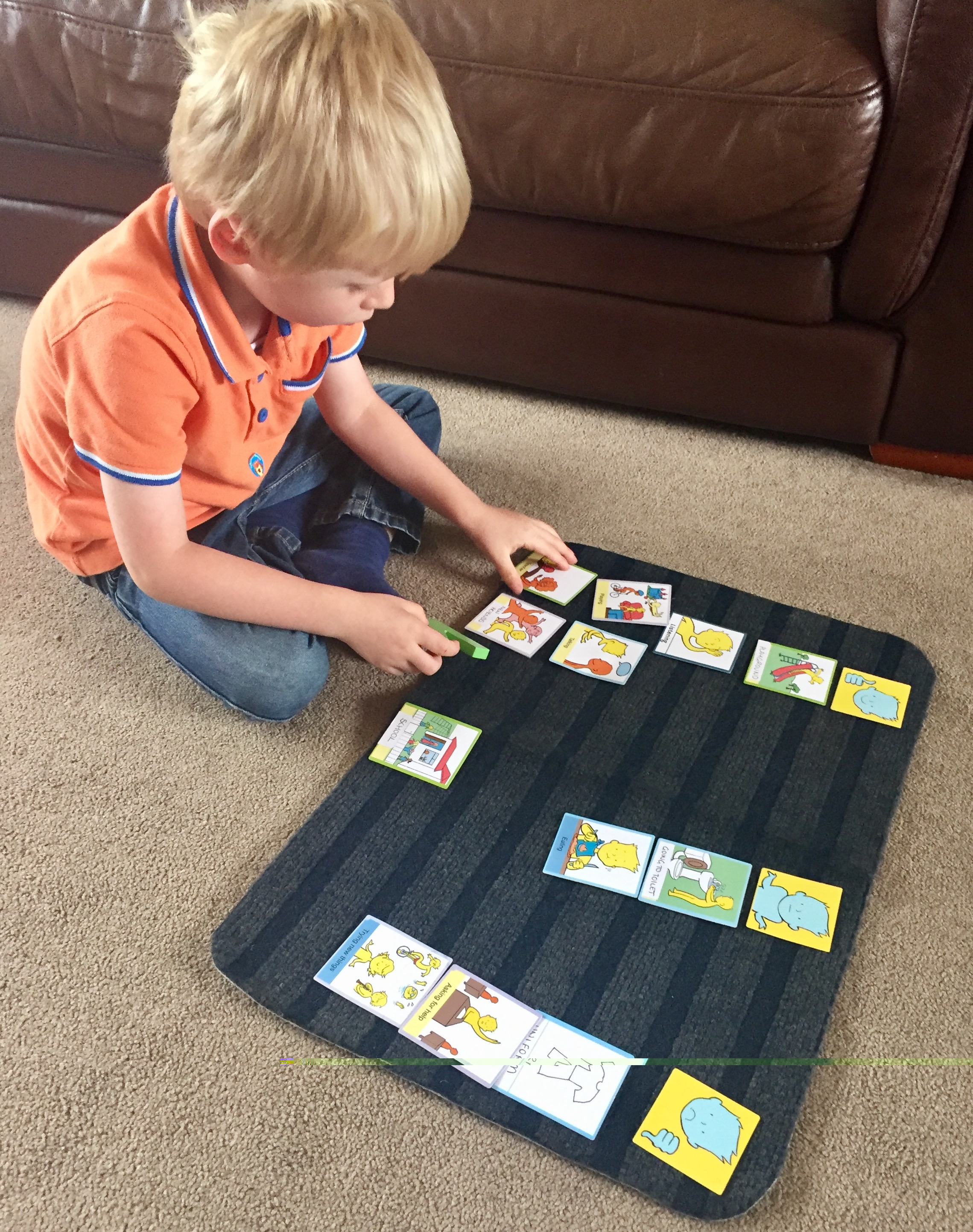
P’s finished mat gives us a clear indication of his feelings about school. The ‘check and change’ stage was very useful as P changed his mind about ‘uniform’ which he had originally placed under ‘Not Happy About’ – he said that actually he is happy because he will look smart in his new uniform!
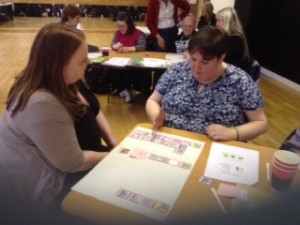
Talking Mats and the National Involvement Network (NIN) have been working together for the past year to enable the NIN members to develop a Talking Mat and to use that Mat to listen to the experiences of people with learning disabilities . It has been a great project and we wrote up the experience of running the training in two earlier blogs.
The first blog described how we worked with the group to develop a Talking Mat to link with the NIN’s charter for involvement . The second how we developed and delivered a Talking Mats training course to meet the needs of the NIN members all of whom have learning disabilities
The group then set off to carry out their Talking Mats conversations supported by staff from their respective organisations and or ARC Scotland. The group decided they wanted to make a film about their experiences of using Talking Mats and ARC Scotland supported them to do this . Rhona and I were delighted when we got this link to the film all about their experiences of using Talking Mats. We really enjoyed watching it and we are sure you will to. https://www.youtube.com/watch?v=0BTlYuqLBXs
Five short stories from our recent accredited training course in Stirling.
- A looked after child was unhappy but no one knew specifically why. Using the Talking Mats, she indicated that she was upset by the weekly phone call with her mother because it always happened when it was her playing time. The time of the call was moved to just before her bedtime but this resulted in bad dreams. The time of the call was finally moved to Saturday afternoon which helped her settle and reduced her distress.
- Talking Mats was used with an Iraqi boy who had come to England via Libya, Italy and the jungle camp at Calais. When he picked the symbol of a waiting room he indicated that despite all she had been through he really liked this because it reminded him of all the children in his family and made him happy.
- A 76-year-old man with a learning disability disclosed that he had been attacked and suffocated by his upstairs neighbour one week previously. It was only when he used the Talking Mats that he disclosed to anyone what had happened.
- A lecturer usually used quantifying measuring with her students to find out how they were managing their studies. Instead she used Talking Mats to find out how they were coping with their work life balance. One student told her that she was managing fine except that her pet rabbits always escape under the bed and it takes her a long time to get them back out so she does not let them out very often!
- Talking Mats was used with a man who had had a stroke and had to go into residential care because his family could no longer look after him. They were very worried that he was unhappy with the new care set up. He was able to show with the Talking Mats that he was happy about everything except that he was not given enough time when he went to the toilet. Once the staff realised this they then gave him more time which resolved the situation and reassured his family.
Please send us your Talking Mats stories – we love hearing them.
It was great to meet with Nikki Steiner, Principal Speech and Language Therapist with Central London Community Health Care Trust (CLCH), to evaluate the work that was commissioned by CLCH. The project started in the spring of 2016 and aimed to support a person-centred and inclusive approach to health planning and intervention using the Talking Mats framework.
Those words ‘person-centred’ and ‘inclusive’ are easy to say but much harder to implement. Our approach was threefold:
- We provided 100 staff with the Talking Mats resources to use in their practice (both the original and digital versions).
- We ran 3 Enhanced Talking Mats training courses for those staff which involved two days training. The first day introduced the framework and built staff confidence in using the resource. The second day supported staff to reflect on their use of the Talking Mats in their work setting, and allowed them to think creatively about further application and development.
- To sustain the capacity of CLCH to continue with the project we trained three accredited trainers. The plan is they will continue to build staff skills and training on an on-going basis and provide local leadership and expertise.
The evaluation framework that we are using looks at impact of this investment using the Kirkpatrick model of evaluation. This allowed us to evaluate:
- Participants’ reaction to the training,
- Participants’ learning – did they increase their knowledge skills and learning?
- Transfer and application – did they apply their learning to the workplace?
- Result – this was based on the impact that using the Talking Mats skills and resources had on the lives of people with communication disability
We had different measurements for each part of the model and these ranged from course feedback, a quiz, personal reflection and stories from people with communication difficulties. It is these that we are in the process of analysing so watch this space for the final report. Nikky said ‘This is such an exciting project that impacts on all the different client groups that we support’.
If you would like to discuss implementing Talking Mats at an organisational level then have a look at this link – Organisational Training
Delighted to introduce you to ‘The Communication Game’ : a board game for staff to improve their communication skills.
How we listen, talk and engage with people is fundamental to the quality and effectiveness of health and social care services. Although communication underpins everything we do in a work context, it can be a difficult topic for staff to talk easily about. Add to that the possibility of service users having an additional communication support need, through reasons like stroke, learning disability or dementia, then there is much potential for things to go awry and unfortunately, they often do. ‘Poor communication’ is cited as the most common cause of frustration in complaints about services.
The Communication Game was developed by Focus Games, NHS Education for Scotland (NES) and Talking Mats. It is a learning tool to help staff working in the health & social care sector increase their knowledge and skills around communication. The Communication Game is fun and easy to play. It can be played with or without a facilitator, and allows staff groups to have discussions and reflect on their communication skills. It allows them the chance to learn from each other. It will improve knowledge, but more importantly enable them to think about the small steps they can make to improve their interactions.
The project grew out of two previous projects funded by NES: Making Communication Even Better and Through a Different Door. In these projects, it was recognised that the experience of services for people with a communication support need is something of a lottery. For them, there was a considerable difference in the experience of interacting with a staff member who was empathetic and able adapt to their communication, to interacting with a member of staff who was struggling and unable to adapt their interaction. Training and understanding of inclusive communication practice is key. It has been a great privilege for Talking Mats to continue to support the work of the previous 2 projects and work with Focus Games Ltd to develop The Communication Game. Support during the development process from the Stroke Association Scotland, Capability Scotland, RCSLT, Scottish Care, Communication Forum, Queen Margaret University and NHS Ayrshire & Arran SLT Department have been invaluable, and we are very grateful; also to NHS Education for Scotland for their continued input and funding.
If you are working with staff in the health and social care sector, then this will be a great resource for you. You can get The Communication Game from the Focus Games online shop. It is guaranteed to promote laughter learning, and a touch of competitive team spirit. Most importantly, it will be a catalyst to help develop staff communication, making interactions better for people with communication support needs.
You can find out more about the game at www.communicationgame.co.uk
, and follow the game on Twitter on @Comm_Game.
Get your copy at www.focusgames.com.
This blog summarises a project we have completed providing Talking Mats training for families living with dementia. A key aspect of the work done by Talking Mats is to find ways to improve communication for families living with long term conditions. In particular dementia is a long term condition where deterioration in communication will eventually affect everyone. This makes it increasingly difficult to ensure that the person with dementia continues to be involved in decisions about their life.
We have completed a project funded by Health and Social Care ALLIANCE Scotland. Training in the use of Talking Mats was given to families living with dementia and staff who worked with these families. The Alliance Family Training final report highlights how this training helped people with dementia to communicate their views and be more involved in making decisions about their lives.
Families identified issues relating to self-management that they had not previously been aware of and new insights emerged as the following comments illustrate.(click on box to enlarge)
For some family members an important outcome was that Talking Mats helped them see that their spouse was satisfied with many aspects of his/her life. They found this very reassuring as many assumed that the person with dementia was frustrated and discontented.
The following is an example of how using Talking Mats helped with self-management.
When using Talking Mats on the topic of Where you live, G explained that he found it difficult to find his way to the toilet in the night. As a result his wife bought special senior night lights to help him which solved their problem. As a result, night times improved for both of them.
For further examples and information read the full report here Alliance Family Training final report and for further information about Talking Mats Family training please contact info@talkingmats.com
The Scottish Government has granted further funding for the Keeping Safe Talking Mats training and resources.
This extension coincides with the launch of the Keeping Safe report 2013-2016 at a seminar on Thursday 19th May at the Raploch Community Centre Stirling. It’s great to hold our event during Learning Disability week where the theme is Celebrating Success. This project has undoubtedly been a success. 234 Keeping Safe communication resources are in use across Scotland. Staff who have used the Keeping Safe resource report that it supports Safeguarding and helps people think how their life is going, enabling them to express concerns they might have, either big or small. The impact that the resource has on the lives of people with learning disability is powerful. You can read more about this in our previous blog or in the Keeping Safe report 2013-2016
The seminar on the 19th of May is an opportunity to share experiences and explore further some of the issues that exist for people with learning disabilities.
The next tranche of funding provides more training courses for:
- People who work with adults with learning disabilities in Scotland to learn the skills and use the resource to support listening to their service users and
- The staff who use the resource regularly to become Keeping Safe trainers and support the aim of ensuring adults with a learning disability in Scotland have access to this communication tool. We particularly want to target geographical areas that do not yet have Keeping Safe trainers, e.g. Dumfries and Galloway and Aberdeenshire.
If you work with adults with learning disabilities in Scotland and would like to apply for Keeping Safe training please contact the office info@talkingmats.com Application for
Striling course 19th August and 16th September is here; 20160610 training flier
Aberdeen Course 9th September and 7th of October is here 20160909 Aberdeen flier
Dumfries and Galloway course 20th October and 25th November is here 20161027 training flier
Further courses are being planned in the Autumn in Dumfries and Central Belt .Please contact Info@talkingmats.com if you wish to be sent the relevant flyer
Following the success of previous seminars we are holding further specialist seminars in Stirling and London for anyone who has done the Talking Mats training. The topics will be:
- Talking Mats and the Eating and Drinking resource (morning)
- Talking Mats and Capacity (afternoon)
During the Eating and Drinking seminar, we provide background on how and why the resource was developed and showed some DVD examples of people using the resource. This really brings things to life and shows how important it is to give people (with and without speech) the opportunity to consider and talk about different aspects of eating and drinking. We also give people hands-on practice in using the symbols from each topic. Each participant will receive a copy of the full Eating and Drinking resource, including symbols, a mat, and explanatory booklet.
During the Capacity seminar we will discuss the fundamental principles of the Capacity Act and participants will have a chance to consider how Talking Mats can help people to:
- understand
- retain/remember
- weigh up information
- communicate their views/wishes and feelings.
They will also be given the opportunity to work through some practical examples and think about options to help people understand issues and make decisions.
If you have completed a Talking Mats training course and would like to attend either of specialist seminars, please click on the relevant course and fill in the registration form.
Stirling on Friday 29th April Stirling Seminars flier Apr 2016
London on Friday 10th June London Seminars flier June 2016
Registration form Seminar registration form 2016
The Keeping Safe Talking Mats resource is a visual framework that has been developed and trialled over 3 years. It provides:
- A listening space for people with learning disability to raise concerns
- A structure for staff to find out what people are thinking about their lives, and raise issues that can be difficult to discuss.
We have produced a poster that describes the development of the resource and where we have got to . Please click here to view CM poster 20150825
The Scottish government learning disability strategy keys to life has 4 strategic outcomes for people with learning disability in 2015-2017
- A health life
- Choice and control
- Independence
- Active Citzenship
Using the Keeping safe resource allows people to think about , reflect on and have their say in these areas. We have loved training staff working in learning disability across Scotland to use it. The feedback on how it is being used is very powerful, so watch out for more blogs that will show how it has helped people with a learning disability have a say in changing and determining their lives.
 Online training login
Online training login 

